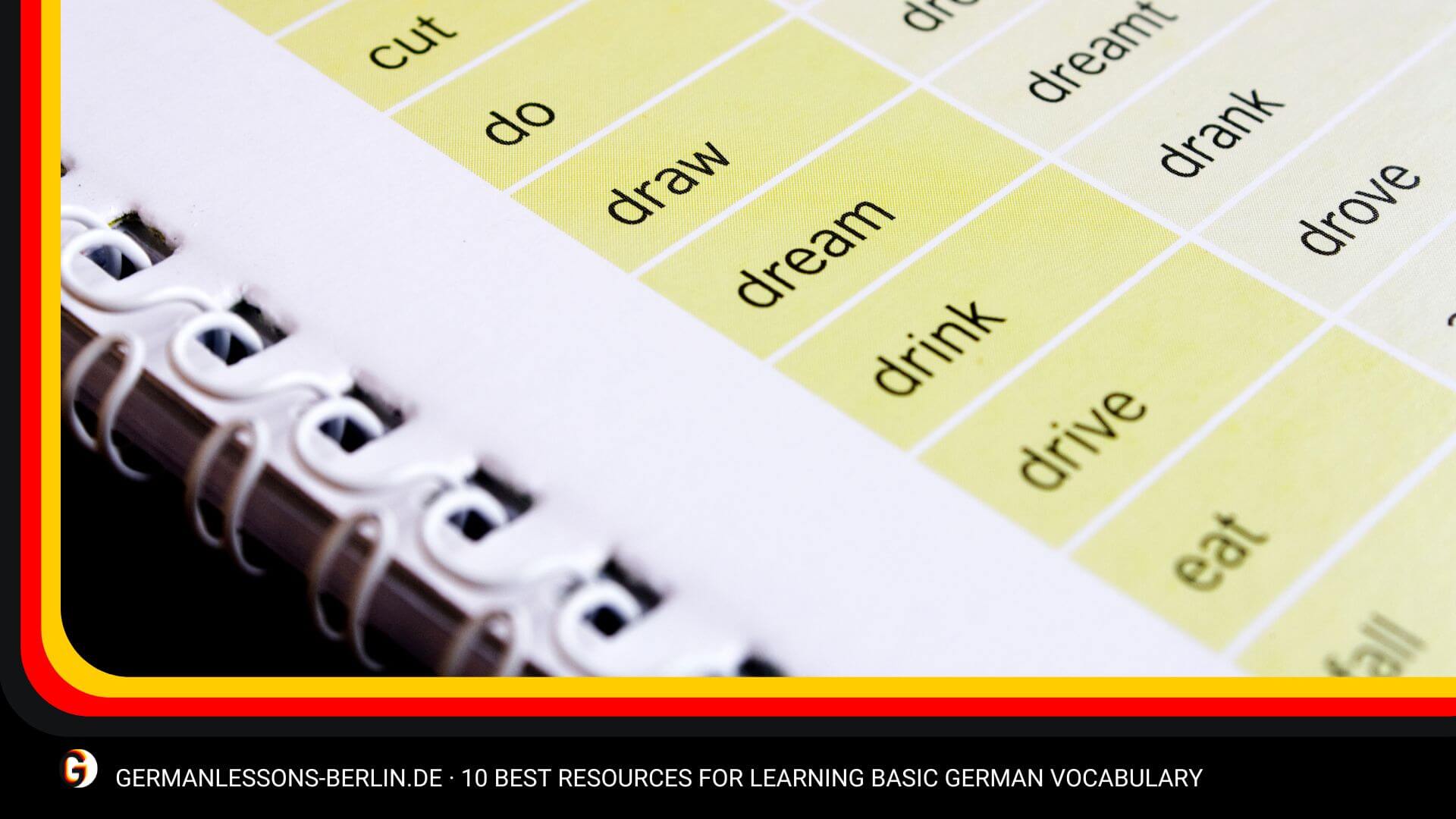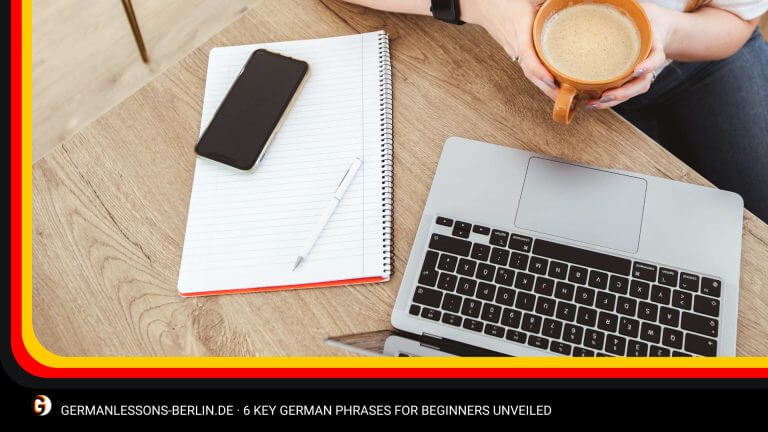I’m on a mission to share the best tools that helped me tackle German vocabulary. It’s a challenge I’ve loved conquering, and now it’s your turn. From slick apps to engaging flashcards, I’ve got the top 10 resources that’ll transform your learning. Whether you’re starting out or brushing up, these gems will have you chatting away in no time. Dive in with me, and let’s unlock the secrets to mastering basic German together!
Table of Contents
Key Takeaways
- Online language platforms and mobile apps offer structured lessons and flexibility for learning basic German vocabulary.
- Flashcards and visual aids enhance memory retention and provide interactive learning for basic German vocabulary.
- Interactive German games combine visual and auditory stimuli for effective vocabulary retention in basic German.
- Language exchange communities provide conversational practice and connections with native speakers to enhance learning of basic German vocabulary.
Online Language Platforms
Several online language platforms have significantly helped me boost my basic German vocabulary. Through interactive lessons and structured courses, I’ve been able to grasp the essentials of the German language more efficiently than I’d imagined. The platforms often use a mix of visual aids, audio clips, and contextual examples, making the learning process not just effective but also quite engaging. I’ve noticed a marked improvement in my ability to construct sentences and understand spoken German.
One of the greatest benefits is the flexibility these platforms offer. I can study at my own pace, fitting sessions into my busy schedule without missing a beat. Now, I’m keen on complementing this online learning with mobile apps that can help me learn on the go.
Mobile Vocabulary Apps
Continuing my journey in mastering basic German vocabulary, I’ve found mobile apps to be indispensable tools for learning on the fly. They offer the flexibility to study anywhere, whether I’m on a bus or waiting in line. Duolingo, for instance, turns lessons into fun, bite-sized challenges, which keeps me engaged. Then there’s Memrise, with its focus on memorization techniques and real-life vocabulary; it’s been extremely helpful for retaining tricky words. Anki, a flashcard app, allows me to create custom decks that target my weak spots. I’ve also delved into Babbel, which has a great mix of vocabulary and grammar. Each app has its unique strengths, and I’m enjoying integrating them into my daily routine to enhance my German skills.
Flashcards and Visual Aids
Switching from digital apps to a more tactile approach, I’ve embraced flashcards and visual aids to bolster my German vocabulary acquisition. There’s something gratifying about physically flipping a card to reveal the translation of a word I’ve just tested myself on. I’ve found that combining images with words on flashcards enhances my memory retention. It connects the vocabulary to a visual context, making it easier to recall when I’m speaking or writing.
I’ve also created a wall of Post-it notes in my room, each bearing a new word I encounter. This visual immersion keeps the language constantly in my peripheral vision, subtly reinforcing my learning throughout the day. It’s interactive methods like these that lead seamlessly into the engaging world of interactive German games, which I’ll explore next.
Interactive German Games
While tactile methods like flashcards have boosted my vocabulary, I’ve also discovered that interactive German games can make learning even more dynamic and enjoyable. These games often combine visual and auditory stimuli, which helps me retain new words more effectively. For instance, I’ve played online matching games where I drag and drop words to their corresponding images. It’s a lively way to reinforce word associations.
Additionally, participating in role-play simulations has allowed me to practice conversational German in a fun, low-pressure environment. Interactive quizzes, on the other hand, challenge me to recall vocabulary under time constraints, which sharpens my memory. These games not only enhance my learning experience but also keep me engaged and motivated to dive deeper into the German language.
Language Exchange Communities
Although I’ve found online games to be helpful, it’s through language exchange communities that I’ve been able to practice and expand my basic German vocabulary in more conversational settings. These platforms have been invaluable in connecting me with native speakers and fellow learners. It’s here that I’ve engaged in meaningful dialogue, putting words and phrases into context. The exchanges are not just text-based; I’ve had voice and video conversations that have significantly improved my pronunciation and listening skills. I’ve discovered that the give-and-take nature of these communities fosters a supportive environment where I’m not just learning, but also contributing by sharing my knowledge of other languages. This reciprocity makes the learning process enjoyable and highly effective.
Frequently Asked Questions
How Can Incorporating German Music and Lyrics Into My Study Routine Improve My Basic Vocabulary Skills?
Incorporating German music and lyrics into my study routine has significantly boosted my vocabulary skills. I’m picking up new words effortlessly as they’re embedded in catchy tunes that stick in my head. Plus, the repetition in songs helps reinforce my memory. Singing along also improves my pronunciation and intonation. It’s an enjoyable and effective way to immerse myself in the language outside of traditional study methods.
What Role Can German Children’s Books and Simple Literature Play in Enhancing My Understanding of Basic Vocabulary?
I’ve found that diving into German children’s books and simple literature sharpens my basic vocabulary. These texts use straightforward language, which helps me grasp fundamental words and phrases more easily. They also offer repetitive patterns that reinforce my learning. By reading stories, I’m exposed to natural sentence structures and everyday expressions, making it a fun and engaging way to enhance my understanding of the language. It’s a strategy I highly recommend to beginners.
Can Watching German Television Shows or Movies With Subtitles Be an Effective Method for Learning Basic Vocabulary, and if So, How Should I Approach It?
Absolutely, watching German TV shows and movies with subtitles can be an effective way to pick up basic vocabulary. I’d recommend starting with children’s programs, as they tend to use simpler language. I often pause to write down new words and phrases, then review them later. It’s important to listen actively and repeat the dialogue aloud to practice pronunciation. Over time, this immersive approach has significantly improved my grasp of the language.
Are There Any German Vocabulary Podcasts Aimed at Beginners, and How Can They Complement Other Learning Resources?
Absolutely, there are German vocabulary podcasts for beginners that I’ve found helpful. They’re great for on-the-go learning and can complement other methods like flashcards or language apps. I usually listen to them during my commute. The repetition and thematic episodes ensure that I’m not only picking up new words but also improving my pronunciation. It’s a hands-free, engaging way to reinforce my learning, making the most of my time.
How Does Keeping a Personal Vocabulary Journal or Diary in German Benefit Language Learners, and What Are Some Tips for Doing It Effectively?
I’ve found that maintaining a personal vocabulary journal in German sharpens my recall and enhances my language usage. It’s a hands-on way to track progress. My top tip is to categorize words by theme, which makes them easier to memorize. I also recommend using the new vocabulary in sentences to contextualize it, and regularly revisiting the journal for revision, ensuring the words stick in my long-term memory.
Conclusion
Armed with these top-notch tools, I’ve watched my German vocabulary flourish. From online platforms to mobile apps, and from flashcards to interactive games, each resource has been a gem. They’ve not only made learning fun but have also connected me with a community of language enthusiasts. Trust me, diving into these resources will make your journey into German as rewarding as mine. So go ahead, pick your favorites, and start building that vocabulary today. Viel Erfolg!








